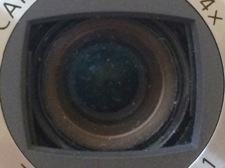Cameras and unintended consequences
 One of the threads in the recent national conversation about interactions between police and communities has been a push for the adoption of body cameras for officers. The general thinking being that having a video record of encounters between officers and members of the public would help sort out what happened in cases involving allegations of police brutality.
One of the threads in the recent national conversation about interactions between police and communities has been a push for the adoption of body cameras for officers. The general thinking being that having a video record of encounters between officers and members of the public would help sort out what happened in cases involving allegations of police brutality.
The body camera topic has already popped up here in the Capital Region and we're guessing its prominence will grow during the next few months. The Saratoga Springs Police Department already has body cameras. And police leaders in both Albany and Troy have expressed interest in acquiring the tech. [Daily Gazette] [TWCN] [CBS6]
So, with that in mind, here's some thought-provoking reading: It's a review of what researchers know, and don't know, about the use of body cams by police so far, published by the think tank Data & Society.
There's a lot in there so you might want to get started with a shorter piece two of the review authors, danah boyd and Alex Rosenblat, wrote for The Atlantic titled "It's Not Too Late to Get Body Cameras Right." A clip:
The temptation of technology as an accountability tool is not new, but accountability is not done by technology. Accountability is achieved by people and systems using tools like technology as part of their bureaucratic processes. There is effectively a global consensus that body cameras are a good thing to have because everyone has a different idea of what they're agreeing to, a different model of appropriate bureaucracy. The bureaucratic and political battles over policies of use, access, and retention are not yet resolved, and they are significant. Who gets to see the footage, and in what circumstances, will matter. The features and capabilities of the technology matter. What happens when the camera reveals more about what was in the officer's scope than what they could physically see at the time, especially at night? Or when cameras get additional features, like heat sensors? Even on basic practical questions, such as whether and when officers or the public should see the footage, there is no consensus.
Boiled down (probably too far), the review is a call to think hard about unintended consequences and to be skeptical about placing all the emphasis on technology as a solution.
Say Something!
We'd really like you to take part in the conversation here at All Over Albany. But we do have a few rules here. Don't worry, they're easy. The first: be kind. The second: treat everyone else with the same respect you'd like to see in return. Cool? Great, post away. Comments are moderated so it might take a little while for your comment to show up. Thanks for being patient.
Comments
Bottom line...cameras may not show you the whole picture but they don't lie about what they do see. Any police force that resists the use of dash and body cams should be suspect. You would think they'd welcome them as a tool for enforcement.
... said Peter Bowden on May 29, 2015 at 8:39 AM | link